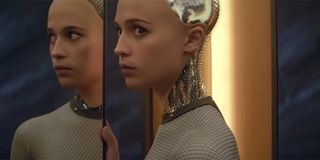Artificial Intelligence Might Affect How Studios Green-Light Movies

For decades, movies have been harbingers of the inevitable machine uprising, when computers become sentient and artificial intelligence rebels against its creators. But despite how large a role artificial intelligence plays onscreen in movies, who could have guessed that it may someday actually affect which movies are made? Yet that is exactly where we may soon find ourselves, as someday AI and machine learning could be used to determine how successful a film will be before it's even made, just by reading the script.
The Belgian artificial intelligence company ScriptBook is one such entity that could completely alter the industry. ScriptBook's technology works by analyzing the text of screenplays to produce box office forecasting for a film. In a presentation at the Karlovy Vary International Film Festival, the company's founder, Nadira Azermai, outlined how ScriptBook's algorithms could have rejected scripts for Sony movies that were box office failures. Sony released 62 movies from 2015 to 2017, 32 of which lost money. By retroactively analyzing the screenplays, ScriptBook's system correctly identified 22 of the 32 films that ultimately lost money. In theory had Sony used this service, the studio could have used this information to reject those films and perform better financially.
According to Variety, the cloud-based ScriptBook service, which is already in use, works by having users upload a PDF of a screenplay into the system. After about five minutes, the ScriptBook service produces a detailed report based on the screenplay that includes a prediction of the MPAA rating, the film's target audience, as well as a forecast of box office performance. The system also analyzes the characters, their emotions, and identifies protagonists and antagonists.
This is all possible thanks to ScriptBook's machine learning. The software took its initial cues from human input and through learning and having read 6500 scripts, it builds huge databases that can be mined. The company claims that a script greenlit by its algorithm has an 84% success rate, which is more than the accuracy rate of humans. The cost of this service, about $5000 per film.
The impact this would have on the industry should it become ubiquitous would be massive, and as with most AI plays, people could lose their jobs. Script readers would become obsolete, and studios would no longer spend money on test screenings, market research and focus groups. And running everything through a machine could dampen creativity, and produce homogeneity in the marketplace.
This technology is fascinating, but I am genuinely curious about the unintended consequences of such a thing. Would this system have predicted Black Panther to be such a hit, or that Solo would underperform? Films succeed and fail for different reasons, and if studios green-light films solely based on a computer's box office prognostications, we may miss out on some great movies. There is also the fact that a script isn't the only ingredient that determines a film's success. Cast, director, promotion, release date and countless other things all play a part. And how many beloved movies now considered classics were box office failures? This is cool technology and it will help studios make informed decisions, but hopefully it is just part of the process and not the sole arbiter.
To see all of 2018's movies greenlit by decaying organic life forms, check out our release schedule and for all the latest in our slow but inevitable march towards the singularity, stay tuned to CinemaBlend.
CINEMABLEND NEWSLETTER
Your Daily Blend of Entertainment News
Nick grew up in Maryland has degrees in Film Studies and Communications. His life goal is to walk the earth, meet people and get into adventures. He’s also still looking for The Adventures of Pete and Pete season 3 on DVD if anyone has a lead.
Most Popular




